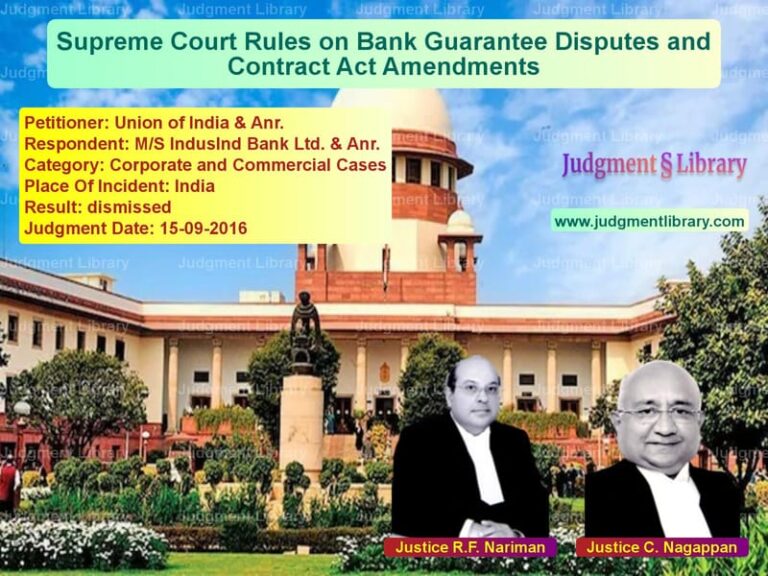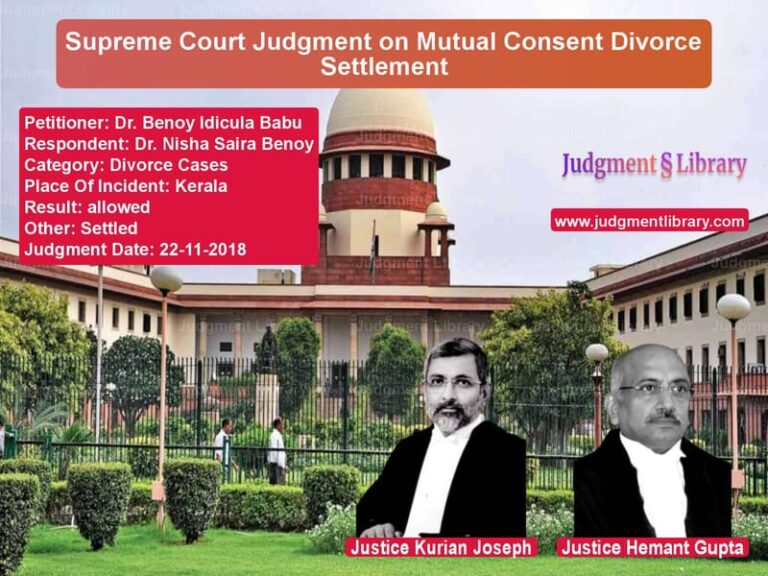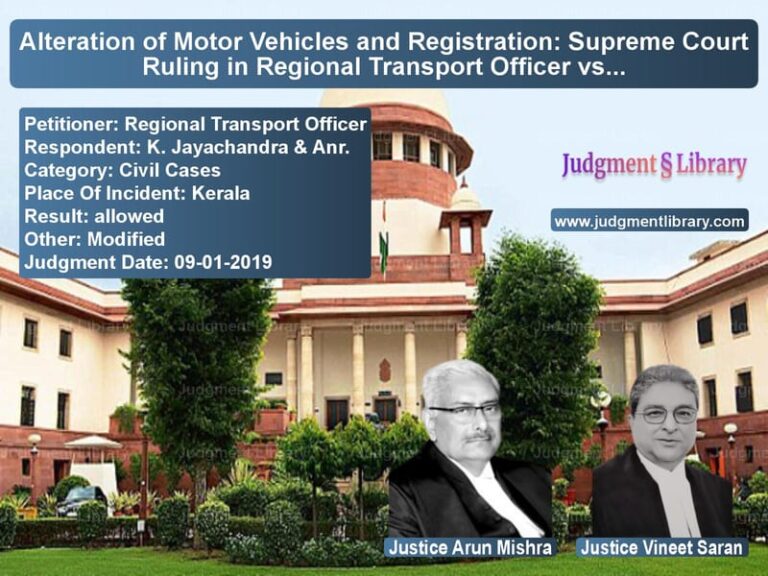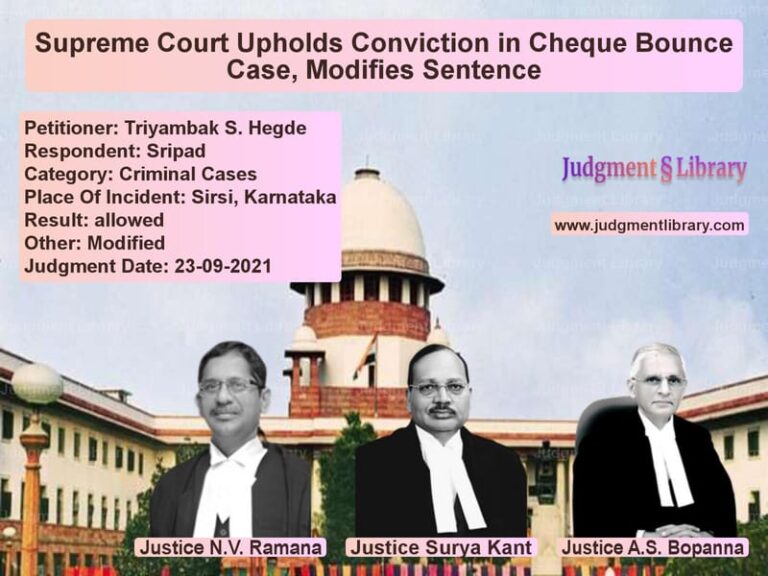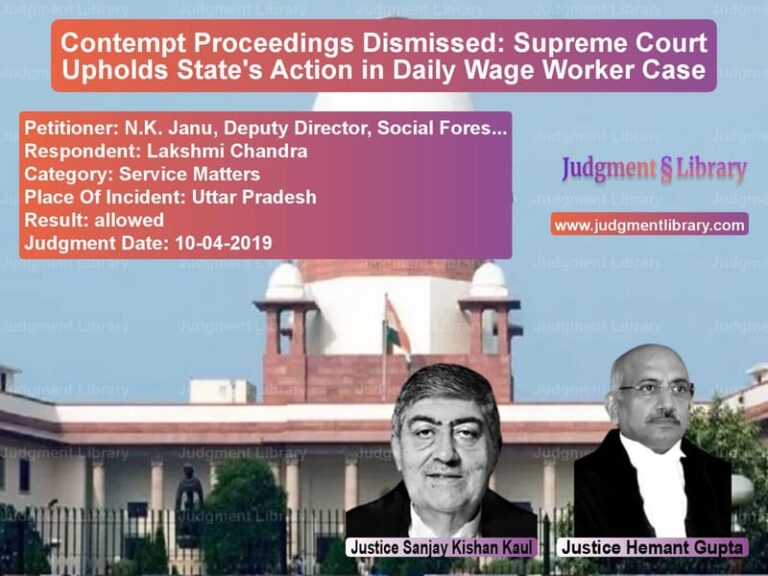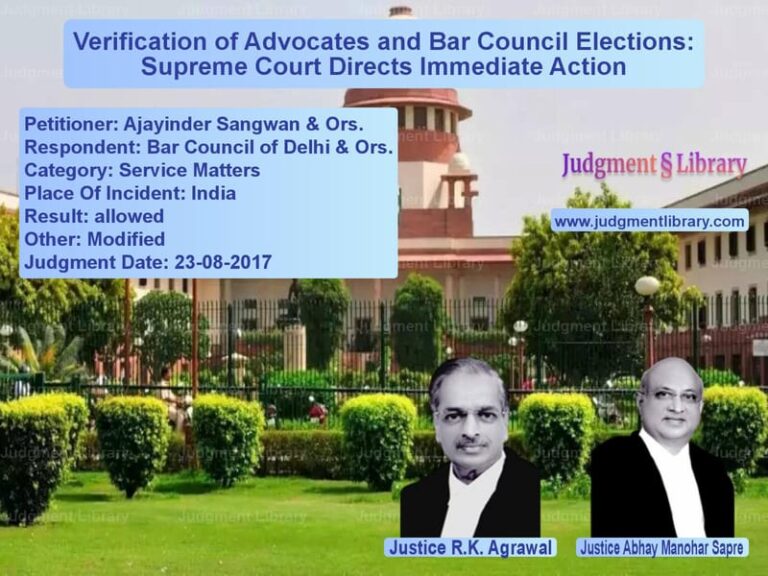Probation of Offenders Act and Minimum Sentence: Supreme Court Grants Relief to Young Offenders
The Supreme Court of India in Lakhvir Singh & Another vs. The State of Punjab & Another addressed a significant legal question regarding the application of the Probation of Offenders Act, 1958 in cases where a mandatory minimum sentence is prescribed under the Indian Penal Code (IPC). The Court examined whether the benefit of probation could be extended to two young offenders who had already served half their sentence.
The Supreme Court ruled in favor of the appellants, granting them probation under Section 4 of the Probation of Offenders Act, 1958, despite the mandatory seven-year minimum sentence prescribed under Section 397 IPC.
Background of the Case
The appellants, Lakhvir Singh and Jagdeep Singh, were young at the time of the incident—20 and 19 years old, respectively. The case stemmed from an event on February 14, 2003, when the appellants, along with co-accused Gurpreet Singh, hired a taxi under the pretense of traveling to a village. During the journey, they assaulted the driver, inflicted injuries with a dagger and knife, and fled with the stolen vehicle.
An FIR was registered on February 15, 2003, under Sections 382 and 307 read with Section 34 IPC. Subsequently, the charges were framed under Section 397 IPC. The trial court convicted the appellants and sentenced them to seven years of rigorous imprisonment. The Punjab and Haryana High Court upheld this decision, leading to an appeal before the Supreme Court.
Key Legal Issues Addressed
1. Whether the Probation of Offenders Act, 1958, Can Override the Minimum Sentence Under Section 397 IPC
The prosecution contended that Section 397 IPC prescribes a mandatory minimum sentence of seven years, and courts lack discretion to reduce the sentence below this period. The appellants, however, sought relief under the Probation of Offenders Act, arguing that their young age at the time of the offense warranted rehabilitation rather than continued incarceration.
2. Whether the Appellants’ Conduct and the Complainant’s Compromise Justified Probation
The appellants presented a compromise deed signed with the complainant, in which the victim stated that he did not wish to pursue further action and had no objection to their release. The appellants had already served about 50% of their sentence. Their counsel argued that these factors, along with their young age, justified granting probation.
3. The Purpose of the Probation of Offenders Act, 1958
The Court examined the legislative intent behind the Probation of Offenders Act, emphasizing its focus on reformation and rehabilitation. The Act aims to prevent young offenders from being exposed to hardened criminals in jail and offers an opportunity for reintegration into society.
Findings of the Court
1. Probation Can Be Granted Despite Mandatory Minimum Sentences
The Supreme Court ruled that Section 4 of the Probation of Offenders Act, 1958, contains a non-obstante clause, allowing courts to override mandatory sentencing provisions. The Court observed:
“The benefit of probation under the said Act is not excluded by the provisions of the mandatory minimum sentence under Section 397 IPC.”
The Court relied on its earlier rulings in Joginder Singh vs. State of Punjab and Ishar Das vs. State of Punjab, which recognized that the Probation of Offenders Act is a reformative statute designed to prevent undue hardship to young offenders.
2. The Young Age of the Offenders and Their Conduct Justified Probation
The Court took note of the appellants’ young age at the time of the offense and observed:
“The appellants were under 21 years of age at the time of the incident. The Probation of Offenders Act was enacted to prevent the confinement of young offenders with hardened criminals.”
The Court also considered the absence of any adverse reports from the prison authorities regarding the appellants’ conduct.
3. The Complainant’s Willingness to Forgive Was a Relevant Factor
The Court acknowledged the compromise reached between the appellants and the complainant, noting that the victim had forgiven the offenders and did not object to their release. While criminal cases generally cannot be quashed merely due to compromise, the Court recognized that it was a relevant consideration in this case.
Read also: https://judgmentlibrary.com/kidnapping-and-consent-supreme-court-revisits-sentencing-in-minors-case/
Supreme Court’s Verdict
The Supreme Court allowed the appeal and granted the appellants probation under Section 4 of the Probation of Offenders Act, 1958. The key directives were:
- The appellants were released on probation after completing half their sentence.
- They were required to furnish a bond with two sureties to ensure good behavior for the remainder of their sentence.
- If they violated probation conditions, they would be required to serve the rest of their sentence.
Conclusion
This ruling establishes crucial precedents regarding sentencing under the IPC and the Probation of Offenders Act:
- The Probation of Offenders Act can override mandatory minimum sentences when justified.
- Young offenders should be rehabilitated rather than subjected to long-term incarceration.
- A compromise with the victim can be a relevant factor in granting probation.
- Courts must balance punishment with reformation to ensure justice.
By granting probation to the appellants, the Supreme Court reinforced the principle that criminal justice should be both punitive and reformative, ensuring that young offenders are given a second chance.
Petitioner Name: Lakhvir Singh & Another.Respondent Name: The State of Punjab & Another.Judgment By: Justice Sanjay Kishan Kaul, Justice Hrishikesh Roy.Place Of Incident: Punjab.Judgment Date: 19-01-2021.
Don’t miss out on the full details! Download the complete judgment in PDF format below and gain valuable insights instantly!
Download Judgment: lakhvir-singh-&-anot-vs-the-state-of-punjab-supreme-court-of-india-judgment-dated-19-01-2021.pdf
Directly Download Judgment: Directly download this Judgment
See all petitions in Bail and Anticipatory Bail
See all petitions in Juvenile Justice
See all petitions in Judgment by Sanjay Kishan Kaul
See all petitions in Judgment by Hrishikesh Roy
See all petitions in partially allowed
See all petitions in Modified
See all petitions in supreme court of India judgments January 2021
See all petitions in 2021 judgments
See all posts in Criminal Cases Category
See all allowed petitions in Criminal Cases Category
See all Dismissed petitions in Criminal Cases Category
See all partially allowed petitions in Criminal Cases Category


